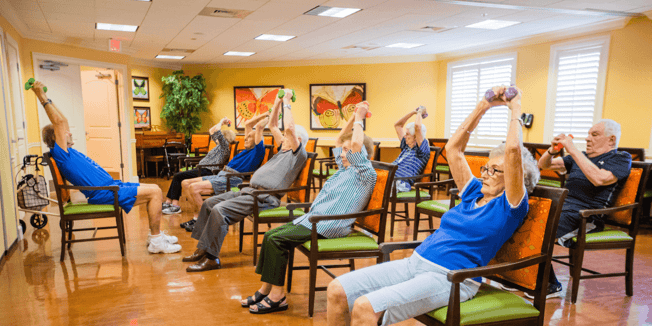Aided Living: a Compassionate Atmosphere for Senior Citizens With Memory Challenges
Aided living facilities progressively work as compassionate environments customized to the one-of-a-kind requirements of senior citizens coming to grips with memory challenges. By providing customized care and organized regimens, these neighborhoods not only boost cognitive function but also foster emotional connections, reducing isolation among locals. Specialized techniques, such as music treatment and reminiscence techniques, are used by qualified staff to promote deeper interaction. However, the performance of these interventions often depends upon the involvement of families in the treatment process, motivating a closer exam of exactly how this collaborative initiative influences end results for both citizens and loved ones.
Recognizing Memory Challenges
Comprehending memory obstacles is essential for supplying reliable like seniors facing cognitive decline. Memory disabilities, which can show up as lapse of memory, confusion, or problem recalling current occasions, are often signs of conditions such as Alzheimer's condition or various other kinds of dementia. These challenges can substantially influence an elderly's capacity to perform daily tasks, preserve social relationships, and handle personal safety.
Acknowledging the different stages of cognitive decline is vital for caregivers and health care experts. Early-stage memory loss may include moderate forgetfulness, while mid-stage decline can result in much more noticable disorientation and confusion. In late-stage dementia, individuals may lose the ability to communicate effectively, requiring comprehensive assistance and understanding from caretakers.
In addition, memory obstacles can stimulate a variety of emotional reactions, including aggravation, anxiety, and depression. This necessitates a thoughtful strategy to care that focuses on the emotional well-being of the person. Recognizing the intricacies of memory difficulties enables caregivers to develop customized approaches that boost communication, promote engagement, and give a feeling of safety. Ultimately, a deep understanding of these obstacles is fundamental to delivering compassionate and effective take care of seniors facing cognitive decrease.
Benefits of Assisted Living
Assisted living deals many benefits for seniors with memory obstacles, offering a helpful environment that promotes independence while making certain safety and treatment. One of the key benefits is the continuous supervision and help available, which assists mitigate threats related to memory-related concerns. Assisted Living. This continuous assistance enables elders to engage in everyday tasks without the worry of crashes or confusion
Additionally, aided living facilities commonly provide structured regimens that can enhance cognitive function and security. These regimens help citizens really feel more safe and minimize anxiety, as they understand what to anticipate each day. Social interaction is another considerable advantage, as these settings encourage connections amongst homeowners, promoting psychological well-being and minimizing sensations of seclusion.
Moreover, helped living personnel are educated to identify the unique needs of senior citizens with memory difficulties, enabling personalized care plans that attend to specific choices view website and needs. This customized approach not only enhances the high quality of care however likewise equips senior citizens to maintain a sense of autonomy. Generally, assisted living works as a thoughtful remedy, stabilizing the demand for assistance with the need for freedom in the lives of elders encountering memory challenges.
Specialized Care Approaches
Carrying out specialized care approaches is crucial for properly supporting seniors with memory obstacles. One essential strategy is person-centered care, which highlights the relevance of comprehending each homeowner's life history, choices, and values.
Another critical approach includes utilizing cognitive excitement therapies. Tasks developed to boost memory recall, motivate social communication, and promote imagination can significantly influence locals' total wellness. Strategies such as reminiscence treatment leverage individual memories to spark discussion and connection, while songs therapy can evoke feelings and memories, offering convenience.

(Dementia Care Charlotte)Furthermore, staff training is essential in carrying out these specialized care approaches. Recurring education equips caregivers with the abilities essential to handle challenging actions and interact effectively with homeowners. Integrating evidence-based practices makes sure that treatment is not only caring however also efficient. By embracing these specialized care techniques, assisted living centers can create an encouraging atmosphere that absolutely deals with the intricacies of memory difficulties dealt with by senior citizens.
Creating a Helpful Area
Central to a helpful area is the visibility of qualified personnel that are sensitive to the special demands of seniors with memory impairments. These experts not just provide vital treatment yet also engage locals in significant tasks that boost cognitive function and promote social interaction. Programs that motivate involvement in group exercises, arts and crafts, or memory games can improve both physical and psychological health.
In addition, a supportive community promotes strong connections among locals. Motivating relationships and peer assistance aids to lower sensations of seclusion and cultivates a feeling of belonging. Regular gatherings and communal dining experiences can even more enhance these bonds, producing an environment where senior citizens feel valued and comprehended.
Involving Households in Care
Engaging families in the care process is essential for providing comprehensive support to seniors with memory challenges. Relative usually function as crucial supporters, providing insights into the person's choices, history, and routines that can enhance tailored treatment. By including them in conversations and care planning, aided living centers can produce a more holistic strategy that reverberates with the local's needs.

Motivating families to take part in treatment not only improves the health of the senior yet also supplies psychological support to relative. Involving households in treatment cultivates a sense of area and belonging, ensuring that senior citizens really feel connected to their liked ones. Inevitably, a collaborative method to care improves the lives of both residents and their families, producing a thoughtful and supportive environment that promotes self-respect and regard.
Conclusion
In conclusion, assisted living serves as an essential source for senior citizens experiencing memory difficulties, providing customized care tailored to individual needs. By involving family members in the treatment procedure, helped living produces a detailed support network, ultimately enriching the lives of residents and their enjoyed ones.
Comments on “Specialized Memory Care solutions for seniors with Alzheimer’s and dementia.”